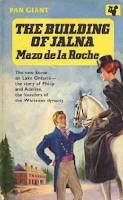
The Globe and Mail, 30 December 1936
A JOURNEY THROUGH CANADA'S FORGOTTEN, NEGLECTED AND SUPPRESSED WRITING

The Dusty Bookcase:A Journey Through Canada'sForgotten, Neglected, and Suppressed Writing





Sara Jeanette (Duncan) "Mrs. Everard Cotes" Cotes


He will not make a cent on it, he said.

The noise came from somewhere very close – surely it was the other side of this very wall, the wall alongside her bed. There was someone in Uncle Jeremiah's room... She looked at the luminous dial of her watch. It was three minutes to four... But who could be in there at this time of night – and for what reason?
 Nearly everything I know about the attractive Miss Fry is found in the book's author biography. Her debut novel, Harsh Evidence, published in London by Wingate (1953) and in New York by Roy Publishers (1956), is held by all of nine libraries worldwide. Harsh Evidence isn't listed for sale online, and seems exceedingly scarce – only the British Library has the Wingate edition – so you'll understand my surprise in discovering that it was translated into both Swedish (De döda tala ej, 1956) and Finnish (Kuolleet eivät puhu!, 1957) .
Nearly everything I know about the attractive Miss Fry is found in the book's author biography. Her debut novel, Harsh Evidence, published in London by Wingate (1953) and in New York by Roy Publishers (1956), is held by all of nine libraries worldwide. Harsh Evidence isn't listed for sale online, and seems exceedingly scarce – only the British Library has the Wingate edition – so you'll understand my surprise in discovering that it was translated into both Swedish (De döda tala ej, 1956) and Finnish (Kuolleet eivät puhu!, 1957) . Did more mysteries follow? The only other books I've been able to uncover by Miss Fry are The Good Cook's Encyclopedia and The Good Housewife's Encyclopedia, both published in the early 'sixties by London's Spring Books. I'll step out on a limb and speculate that a third Spring title, Cooking the American Way, is naught but a repackaging of the first.
Did more mysteries follow? The only other books I've been able to uncover by Miss Fry are The Good Cook's Encyclopedia and The Good Housewife's Encyclopedia, both published in the early 'sixties by London's Spring Books. I'll step out on a limb and speculate that a third Spring title, Cooking the American Way, is naught but a repackaging of the first.

The Whiteoak books represent the idealized portrait of Canada, which all English people have. Life is hardly ever painful at Jalna. It's comfortable, it's exciting, there are domestic dramas going on. I think that Englishmen like to believe that anywhere abroad life goes on as it used to go on in England. We always like to think that life for our parents must have been wonderful and life for us is horrid. Englishmen reading about the Whiteoaks think that life is lived that way now, and we know that life is not lived that way in England – or in Canada.
– Lovat Dickson
 By the mid-sixties, Pan, de la Roche's British paperback publisher since 1948, had sold more than two million copies of the series' titles. Things were still balmy on 20 May 1971, when The Whiteoaks of Jalna began filming. In The Secret of Jalna, the enthusiastic Ronald Hambleton writes of "the careening Jalnawagon, whose pace as a literary phenomenon has showed no signs of slackening since Mazo de la Roche pencilled the first lines in late 1925."
By the mid-sixties, Pan, de la Roche's British paperback publisher since 1948, had sold more than two million copies of the series' titles. Things were still balmy on 20 May 1971, when The Whiteoaks of Jalna began filming. In The Secret of Jalna, the enthusiastic Ronald Hambleton writes of "the careening Jalnawagon, whose pace as a literary phenomenon has showed no signs of slackening since Mazo de la Roche pencilled the first lines in late 1925."

















The Dusty Bookcase:A Journey Through Canada'sForgotten, Neglected, and Suppressed Writing





